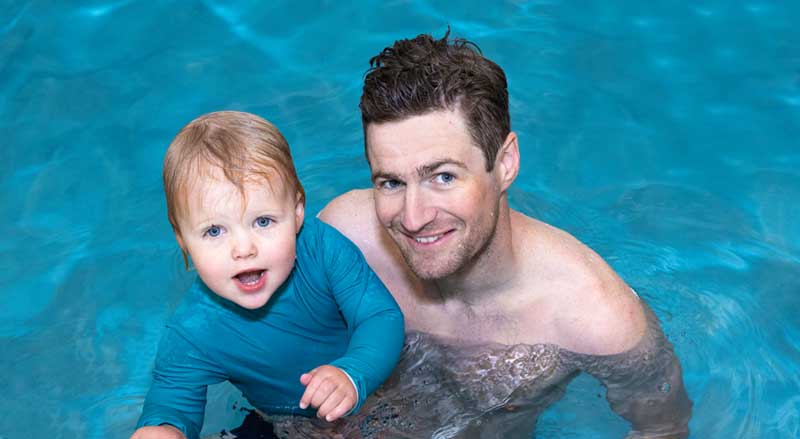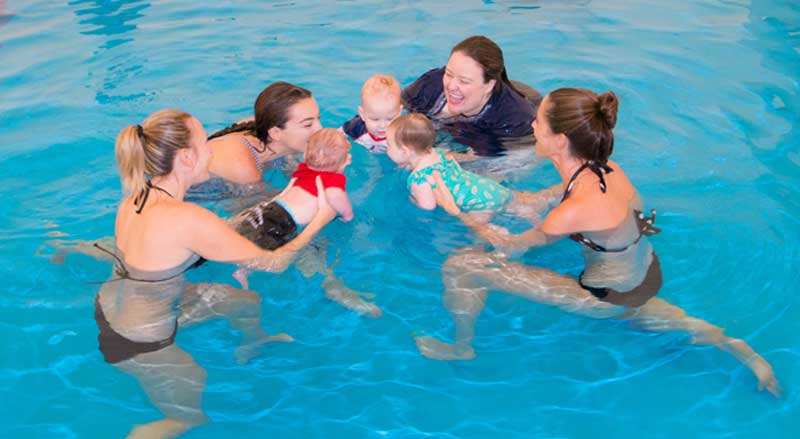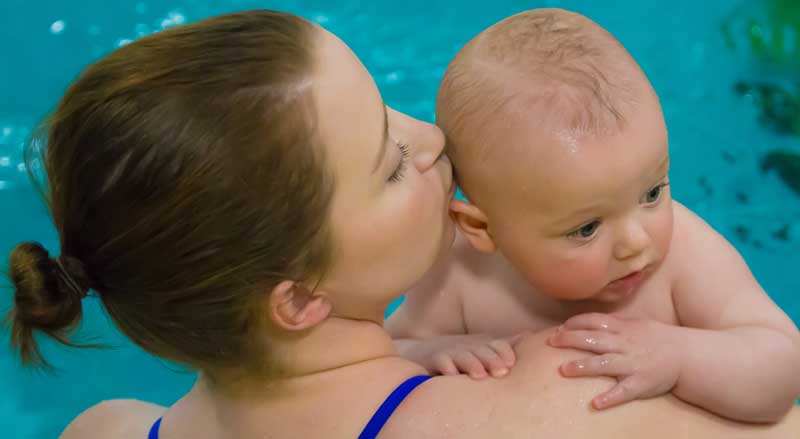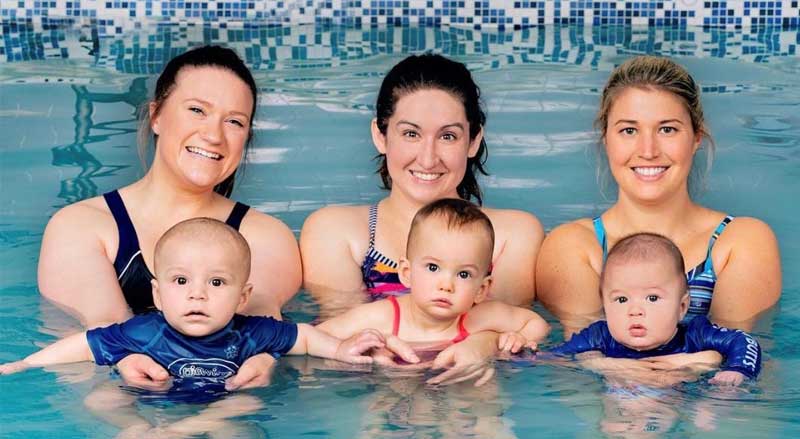My baby isn’t even old enough to walk, talk, or even hold a toy. Why should I spend time on baby swim lessons? Are they really going to get anything out of it? What can they possibly learn at such a young age?
These are very common questions we hear every day about infant swim lessons. Below are some of the reasons it’s important to introduce your little one to the water at an early age and enroll them in a baby swim class.
Baby Swim Lessons Are Fun
Most babies love being in the water. And the sooner you introduce your child to the water, the less likely your child will develop a fear of it later.
Increase Cognitive Development in Babies
Studies have shown that the gentle movements performed when swimming teach babies to engage both sides of their body simultaneously.
This bilateral movement not only helps develop and maintain muscle memory but also increases brain development—especially in the corpus callosum. This area of the brain facilitates efficient learning and recall for visual and verbal information.
Natural development of the corpus callosum has a positive impact on your child’s communication and modulation from one side of the brain to another. This can affect your child’s future abilities in these important areas:
- Language development
- Problem solving
- Spatial awareness
- Academics and reading
When you see your child having fun in a Water Babies class, know that they’re not just splashing around in the water! They’re using movements that can contribute to improving their cognitive skills for improved reasoning when they’re older.
Here’s six ways swimming makes your baby smarter.

Support Physical Development
Increased movement through swimming helps your baby develop and strengthen every part of their body. Feeling their own balance and buoyancy in the water will help develop vital muscles and ligaments, as well as improve muscle control, balance, and motor skills.
Physical improvements in babies also include strengthened hearts, lungs, brains, and blood vessels. Legs, arm, and neck muscles also become stronger.
Water movement helps babies develop greater muscle coordination. This is important as babies master arm and leg movements—whether grabbing at toys or taking their exciting first steps.
Water movements also allow babies to move parts of their body without placing excess stress on other areas, keeping your baby feeling comfortable without muscle soreness.
Did you know babies are natural swimmers? In fact, babies under 6 months of age are still apt to remember the swimming reflexes developed in utero, including the Mammalian Dive Reflex, Flexor Reflex, and Moro Reflex.
Improved Eating And Sleeping Patterns
A baby swim class can also cause positive changes to your baby’s sleeping patterns.
Water Babies use lots of energy as they have fun mastering movement in our pools. They may want to take an extra nap after swim time, or even go to bed a bit earlier that night.
Pool time can reduce stress levels and help babies sleep better. The activity calms them down and gives them important exercise during the day. Babies love to crawl around—but water activity adds a fun and different activity to their day!
And all that time spent moving in water naturally burns off calories and increases your baby’s appetite. Physical movement and a healthy appetite positively contribute to your baby’s healthy development.
Improve Confidence and Self-Esteem
A typical Infant swim class incorporates water play, social interaction, songs and skin-to-skin contact with a caregiver or parent.
These elements of a structured class, plus the excitement of learning something new, automatically boost your baby’s self-esteem.
Think of how much fun older children have shouting “watch me” as they excitedly show of a new swim stroke. Water Babies are proud of their new achievements as well—but they’re often too young to verbalize them!

Babies benefit by sharing a fun and learning experience with other members of their Water Babies group. They make new friends and share exciting new experiences with others. Young ones can even learn to work as part of a group in their infant swim class. All of this contributes to a baby’s self-esteem.
Studies have shown that children who had taken consistent swim lessons from 2 months to 4 years had a greater sense of self control, a stronger desire to succeed, and were more confident in social situations. They also showed greater independence.
Reduce the Risk of Drowning
Studies have shown that formal swim lessons reduce the risk of drowning in children over the age of 4.
According to the American Academy of Pediatrics (AAP), drowning is the leading cause of death among toddlers—most of which occur at home in the family swimming pool.
It’s never too early to start teaching your child a life-saving skill like rolling to find a back-float or reaching up for safety and climbing out of the pool. It will help them remain calm and buoyant should a dangerous situation occur.
But you always want to supervise your child whenever they are near water—even if they have had swim lessons. And never leave them alone. This is as true for the bathtub as it is for a pool. A young child can drown in as little as one inch of water.
Baby swim lessons also make parents more aware of drowning hazards and the safety skills to encourage and reinforce with their children.
Bond With Your Water Baby!

Taking part in a Water Babies swim class with your infant provides a great bonding opportunity for parent and child. It’s a great way to slow down each week and just focus on the class experience with no distractions.
Swim lessons with our babies brings us into the present moment while teaching a valuable and life-saving skill.
As the mom, dad, or caregiver, you too can relax and have fun. Simply pay attention to the teacher’s instructions and follow their lead.
At Njswim, our teachers make sure that both you and your baby have a great time at your Water Babies class.
Here’s one parent’s Water Babies experience. It offers lots of supportive and practical tips for new moms.
And don’t think your child is the only one who will benefit from the Water Babies experience. Here are six ways parents benefit from water babies!
Water Babies at Njswim in New Jersey
Our Njswim Water Babies program is open to babies between the ages of 3 and 30 months.
Attending a Water Babies class at Njswim with your infant is a great, one-on-one bonding experience.
Have fun with your child as they learn breath control, balance, buoyancy, and movement in the water. Plus, our “Learn to Float” philosophy will set the foundation for your child’s lifetime love of the water.
Here’s more information on Njswim’s Water Babies Program and how to enroll today!

